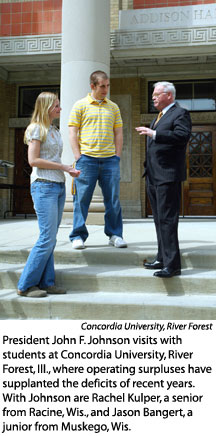Concordia University in River Forest, Ill., is reporting a brighter financial picture as it nears the end of this fiscal year. For the second year in succession, administrators will close their books with an operating surplus on June 30, following operating losses between 1999 and 2003.
Revenue from increased enrollment, cost reductions, and expense containment account for the turnaround, according to Dr. Alan Klaas, senior vice president for university advancement.
Aided by one-time revenue producing measures, Concordia achieved an operating surplus of almost $500,000 during the 2003-04 fiscal year — compared with 
The university is projecting operating surpluses this year and for the next two fiscal years, Klaas added.
As part of the cost containment, the university eliminated 57 faculty and staff positions during the 2003-04 academic year. “It was all part of an effort to bring expenses in line with realistic income projections,” Klaas said.
Enrollment at Concordia reached 2,210 students this spring, a 29 percent increase from a year ago. The total includes 1,256 graduate students — about 800 more than last year — most of them enrolled in two master’s degree programs.
Klaas said the two graduate programs provide teachers with the credentials they need to meet state requirements. “We are running classes at approximately 37 sites — mostly schools — around Chicago. By September we will be at 47 sites,” he said, “We run the programs where the students are, rather than requiring them to come to our campus.”
During the past two years, the university’s debt was reduced to $37 million from $44 million. The university sold property adjacent to the campus and received a $1.85 million grant from the Concordia (River Forest) University Foundation that was matched by the LCMS Risk Endowment Fund.
Favorable interest rates also resulted in savings when the university refinanced its debt into local banks. On Sept. 30, 2003, loans and letters of credit covered by the Synod, Concordia University System, and the Lutheran Church Extension Fund stood at $43 million — $18 million in cash loans plus a $25 million loan guarantee. Today, the university owes no money to the Synod, CUS, or LCEF, although LCEF is guaranteeing a $12 million loan.
“In my view this shows the improved financial strength of the institution,” said Dr. Thomas Kuchta, LCMS vice president–finance/treasurer. “In the process of refinancing their debt, Synod guarantees were not required.”
The debt reduction and loan restructuring save approximately $1.5 million annually in interest and fee payments.
Klaas explained that three factors led to the university’s financial difficulties:
- extensive construction projects, including an $11 million parking facility that was required by the village; improvements to the track and football field; technology upgrades in dormitories; and construction of the Christopher Center.
- five years of operating losses funded with a line of credit that was rolled into short-term debt, which created credit problems.
- a decline in enrollment from an all-time high of 2,400 in the 1990s to 1,700 in 2003, without the university making related changes in sizes of faculty and staff.
Klaas credited a number of people for helping the university turn around the financial situation. Spearheading the recovery was Dr. Ralph Reinke, former president of Concordia Publishing House and Concordia University in Seward, Neb., who joined the staff as special executive in March 2003 and served as chief executive officer from July 2003 to November 2004.
“Dr. William Meyer, president of Concordia University System, and Merle Freitag, president of LCEF, spent hundreds of hours working with their organizations, former Concordia creditors and many others,” Klaas said. “They have helped assure that our university continues being a leader in Lutheran higher education. We are extremely grateful to these two churchmen and their respective boards.”
In a news release from the university, Tom Hallet, chief financial officer since September 2003, attributed the turnaround to many individuals’ commitment to the long-term success of the university. “This commitment came not only from the Board of Regents and management, but also the faculty, the staff, and the LCMS,” he said. “This combined effort led to a total change in the inner culture of the organization, making the turnaround possible.”
Dr. Fred Boos, senior vice president for academic affairs, commended the faculty and staff for their involvement. “The faculty has risen to the challenge of handling these huge enrollment increases while still maintaining the quality of programs which has been a hallmark at Concordia for the last 140 years.”
Posted May 31, 2005
